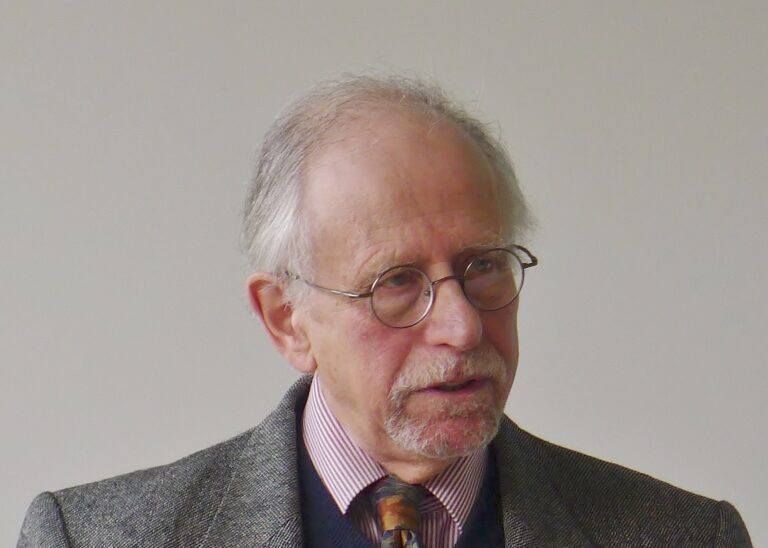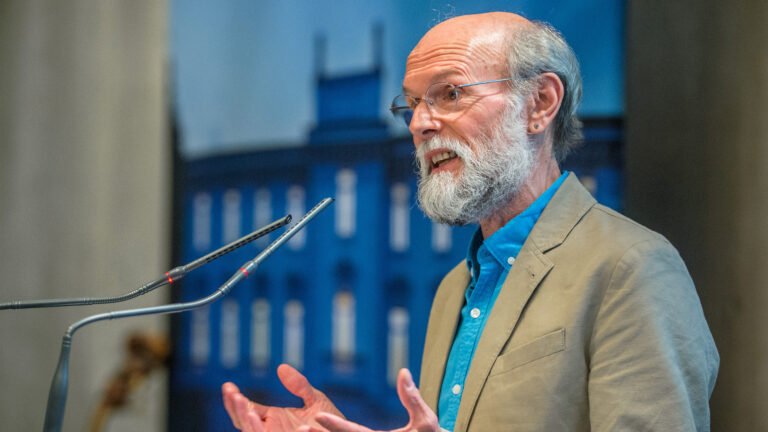Outstanding Achievement Award
The SSN Outstanding and Sustained Achievement Award recognizes distinguished academic achievement in Surveillance Studies. The person nominated have made an outstanding and sustained contribution to the field, from any disciplinary background and have “made a difference” to how Surveillance Studies is understood and practiced. While outstanding excellence is the key criterion for the award, the committee will also take into account gender and visible minority status.
A nomination letter is required from at least two members of the Surveillance Studies Network to the Directors of the SSN, stating the case for their nominee. Either a link to the nominee’s website should be provided or a copy of the nominee’s CV should be attached to the original nominator’s letter. The SSN directors will adjudicate the nominations.
The award will be announced on the SSN website and presented at the biennial SSN conference, where the winner will normally make a speech.
Winner 2024

Charles Raab
The winner of the SSN Outstanding Achievement Award for 2024 is Charles Raab. He was nominated by Dr. Kirstie S. Ball and Dr. William Webster of the Centre for Research Into Surveillance and Privacy (CRISP). The award will be presented at the 10th Biennial SSN / S&S Conference in Ljubljana, Slovenia, 29-31 May 2024.
Charles Raab is Professor Emeritus in the Department of Politics and International Relations at the University of Edinburgh, having attained his Professorship at Edinburgh in 1999. His contributions to Surveillance Studies have been remarkable. A Government specialist by training, he came to Surveillance Studies in the 1990s after a twenty five year research career focusing on Education Policy.
Charles’ extraordinary intellect is always accompanied by an irrepressible curiosity, an unrivalled attention to the detail of argumentation and logic as well as an incredible sense of fun.
Charles’ contributions to Surveillance Studies have been both scholarly and collegiate. He has over 100 publications and started writing about Data Protection in the context of eGovernment in the mid 1990s. His collaborators around that time include Professor John Taylor, Professor Perri 6 and Professor Christine Bellamy. Later, he published the groundbreaking book ‘The Governance of Privacy’ with Colin Bennett.
He was instrumental to the foundation of Surveillance Studies Network and was one of the early Directors. He contributed the regulatory chapter of the influential Report on the Surveillance Society in 2006 and its subsequent update in 2010. He has worked on many of the research projects which have shaped our field in Europe and Canada: The New Transparency (SSHRC), Living in Surveillance Societies (EU-COST), Increasing Resilience in Surveillance Societies (IRISS – EU Framework 7), Privacy and Security Mirrors (PRISMS – EU Framework 7) and more recently PATH-AI (ESRC), which compared Japanese and British approaches to AI regulation. It was because of the proliferation of these research projects focusing on Surveillance that he co-founded the Centre for Research into Information Surveillance and Privacy (CRISP) Kirstie Ball and William Webster in 2012. At the same time, he and William Webster co-founded the ScottishP rivacy Forum with the UK Information Commissioners Office in Scotland.
Charles’ influence extends far beyond academia. He is highly respected in the Data Protection practitioner and policy-making communities. His expertise has also been recognised by visiting positions at leading Universities as well as by consultancy and advisory work to public bodies. Currently a Turing Fellow, he has held visiting positions at the Oxford Internet Institute and the Tilburg Institute for Law, Technology and Society.
Most notably in 2009 he was appointed Specialist Adviser to the UK House of Lords Select Committee on the Constitution which resulted in the report ‘Surveillance, Citizens and the State’. He has advised Liberty, the EU’s Fundamental Rights Agency and the New Zealand Law Commission on matters of Surveillance and Privacy regulation.
Past Winners

2022 - Valerie Steeves
Professor Valerie Steeves was awarded the Outstanding Achievement Award for 2022. She was presented with the award at the 9th Surveillance Studies Network / Surveillance & Society Conference at Erasmus University Rotterdam, 1-4 June 2022.
Dr. Valerie Steeves is a Full Professor in the Department of Criminology of the Faculty of Social Sciences at the University of Ottawa. Her main area of research focuses on the impact of new technologies on human rights. She is the principal investigator of The eQuality Project, a SSHRC-funded partnership of researchers, educators, advocates, civil society groups, and policymakers who are interested in examining the impact of online commercial profiling on children’s identities and social relationships. As the lead researcher for MediaSmart’s Young Canadians in a Wired World research project, she tracked young people’s use of new media from 2004 to 2020.
Dr. Steeves has appeared as an expert witness before a number of Canadian Parliamentary Committees regarding digital policy legislation and has worked with a number of government departments to develop privacy education curriculum and materials. Her Web-based educational game Sense and NonSense won the first annual Excellence in Race Relations Education award from the Canadian Race Relations Foundation in 1998 and her game Privacy Playground was awarded the Bronze Medal at the 2006 Summit Creative Awards Competition, an international competition involving thousands of entries from 26 countries.

2018 - David Lyon
Professor David Lyon was the Outstanding Achievement Award winner for 2018. The award was presented at the 8th Surveillance Studies Network / Surveillance & Society conference, held at the Aarhus University, Denmark.
David Lyon was the co-founder of long-time Director of the Surveillance Studies Centre and Queen’s Research Chair in Surveillance Studies, at Queen’s University, Canada. He remains Professor Emeritus in Sociology and in Law there. Educated at the University of Bradford in the UK, Lyon has been studying surveillance since the mid-1980s. Credited with spearheading the field of “Surveillance Studies”, he has produced a steady stream of books and articles that began with The Electronic Eye (1994) and continued with Surveillance Society (2001), Surveillance after September 11 (2003), Surveillance Studies: An Overview (2007), Identifying Citizens (2009), Liquid Surveillance (with Zygmunt Bauman, 2013) and Surveillance after Snowden (2015). His most recent publications was The Culture of Surveillance (Polity, 2018), and forthcoming is Surveillance: A Brief History (Oxford). He has also co-edited a number of other books, mostly the products of team projects on surveillance, with research funding totalling almost $8 million, most recently the Big Data Surveillance project (2015-2021), funded by the Canadian Social Sciences and Humanities Research Council (SSHRC). He is on the editorial boards of a number of journals, including Surveillance & Society and The Information Society. Winner of the SSHRC Impact: Insight Award (2015), Lyon has also received numerous awards for his work, from Canada, Switzerland, the USA and the UK.

2016 - Oscar Gandy
Professor Oscar Gandy won the 2016 Surveillance Studies Network Outstanding Achievement Award. He was given the award in a ceremony during the 7th Surveillance Studies Network / Surveillance & Society conference, held in Barcelona 21–23 April 2016. After receiving the honour, he delivered a keynote on “Surveillance and the public sphere” and later updated this for publication in Surveillance & Society, which can be found here.
David Lyon on Oscar Gandy in his citation during the ceremony:
Without a doubt, Oscar Gandy is a great pioneer of surveillance studies, in daring to sketch out a new research area, insisting on the imperative of empirical analysis, in showing that surveillance is a social justice issue and arguing that something can be done. Let me say something about each.
First, Gandy took a lead in examining a fresh field of study, based in communication studies and focusing on the development of computer-based classifications of consumers within the rapidly growing practices of marketing. He demonstrated how surveillance of consumers was no less consequential than that of workers or citizens and that this could be empirically substantiated. Investigative journalists such as Erik Larson were also active. Larson produced a documentary (We know where you live) and a book (The Naked Consumer, 1992) but the first, and seminal, social science research was done by Oscar. We now discover, from scholars such as Josh Lauer, the C19th and C20th roots of consumer surveillance and this has extended our understanding of the panoptic sort. But Oscar set the ball rolling.
Second, throughout his work, Oscar has shown a strong and exemplary commitment to empirical inquiry with the use of a novel and important range of methodologies characterizing his work. This has inspired many others working in the field, including some of my own PhD students. Some work directly in the field of consumer surveillance – such as with loyalty programs – whereas others have applied Gandy’s work to different but cognate fields – such as credit scoring in post-Apartheid South Africa. While the panoptic retains its Foucaldian significance for disciplinary practices, for Gandy, it’s the political economy of information that supplies the crucial, critical stance that raises the profile of socio-economic position as a means of shaping life-chances and choices.
Third, Oscar’s work clearly links surveillance with social justice issues, of access to resources and fairness of distribution. He traces the uneven impacts of surveillance to the social location of its subjects and how they are sorted. This is seen most clearly in terms that are now basic to the surveillance studies lexicon, such as “cumulative disadvantage” (to which one might well add today, “intersectional” disadvantage). Such phrases, along with “rational discrimination” that is “cumulative disadvantage’s” supposedly neutral enabling practice, capture in meaningful and memorable concepts the explanatory keys of Gandy’s scholarly work in the area. And they also offer a strong springboard into policy analysis and proposals – which is where Oscar’s work also makes an impact.

2014 - Gary T. Marx
Gary T. Marx was the winner of the first Surveillance Studies Network Outstanding Achievement Award in 2014. The award was made at the 6th Biannual Surveillance Studies Network / Surveillance & Society in Barcelona, 24th – 26th April 2014. A transcript of the presentation can be found here.
Professor Marx was nominated for the award by Professors Colin Bennett, David Lyon and Val Steeves. They spoke not only of his enormous achievements as a scholar but also of his kindness, collegiality, mentorship and his never-ending sense of humour. Gary’s monograph Undercover, which received the Outstanding Book Award from the Academy of Criminal Justice Sciences, set the benchmark for studies of police surveillance when it was published in 1988. The excellence of his scholarship has been recognized by awards such as the American Sociological Association’s Jensen Lecturer for 1989-1990, the Distinguished Scholar Award from the ASA’s section on Crime, Law and Deviance, the Silver Gavel Award from the American Bar Association, the Bruce C. Smith Award for research achievement, the W.E.B. Dubois medal, and the Lifetime Achievement Award from the Society for the Study of Social Problems.
Colin Bennett writes: ‘Gary Marx’s voice is unique in surveillance studies, and sociology more generally. He has never been afraid to push the boundaries of social inquiry, not by developing new theories, metaphors or models, but by patiently amassing a staggering variety of facts, stories, cases, incidents, and anecdotes and by trying to make some sense of the bewildering, staggering and increasing propensity for surveillance in the contemporary world.’
